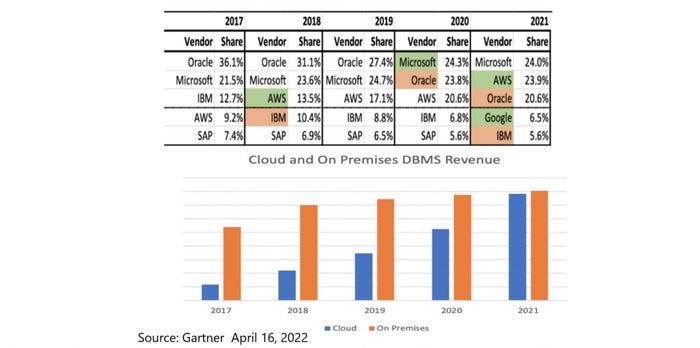Oracle Boosts Exadata Database Cloud Service Performance, ScalabilityOracle Boosts Exadata Database Cloud Service Performance, Scalability
An update to the Oracle Cloud VMware Solution is also now available with AMD EPYC processors.
April 21, 2022

Oracle’s Exadata Database Cloud Service is now available in its public cloud with a major boost in performance and scalability. The Oracle Exadata Cloud Infrastructure X9M, released on Wednesday, adds onto last fall’s on-premises upgrade to Oracle’s Autonomous Database.
The Oracle Exadata Database Cloud Service is compatible with the customer-managed; on-premises traditional Exadata Database Machine. Likewise, it works with the Oracle-managed, subscription-based Cloud@Customer release, which is a public-cloud version that runs on a customer’s premises.
Also managed by Oracle, the Exadata Database Cloud Service provides the autonomous, in-memory database in Oracle Cloud Infrastructure (OCI), the company’s public cloud IaaS. Oracle’s OCI now is available worldwide in 37 regions, including seven dedicated to governments with seven more commercial sites planned. Oracle also now has 11 Microsoft Azure Interconnect regions based on a multicloud partnership announced in 2019. The new 9XB isn’t offered in the Azure Interconnect regions; it’s optimized for OCI.
Exadata is Oracle’s scale-out, high-performance platform consisting of compute, storage and network consolidated with the company’s enterprise database. Designed to run on customers’ premises or in OCI, large enterprises such as telcos and financial service providers use Exadata. According to Oracle, Exadata provides persistent memory, SQL query offload and resource management to optimize OLTP and machine learning workloads.
Oracle emphasized that the database uses RDMA rather than I/O to read persistent memory in “smart storage,” providing lower latency. This approach is 10 times faster than flash, according to Oracle. The company claims that results in 25 times better OLTP I/O latency than all-flash instances of AWS RDS and 50% faster than all-flash Azure SQL.
Shifting Enterprise Database Market
Nevertheless, once the leading database provider, Oracle has ceded share to AWS and Microsoft, Gartner reported last week. After dropping to No. 2 in 2020, Oracle fell again last year to No. 3. Microsoft, which took the top spot in 2020 and retained it last year. But Microsoft experienced a fraction of a percent decline, with Amazon surging three points. IBM and SAP also fell, with Google appearing in the top five last year.
Gartner’s figures report accounts for cloud and on-premises database revenues, VP and analyst Merv Adrian noted.

“Oracle’s revenue in the cloud has grown well below market rates,” Adrian noted. But he added: “The share of overall DBMS market revenue held by the top vendor cohorts continues to shrink, even as the vendors themselves change.”
Xadata Cloud Service X9M: Higher Performance and Scalability
An upgrade to the Exadata Cloud Service X8M released in 2020, Oracle claims X9M can run database workloads significantly faster. Oracle said it offers 87% greater SQL IOPS performance for OLTP, with less than 19 microseconds SQL read latency. It also has two-and-a-half more database cores, 28% greater storage capacity and double the bandwidth for application server clients. For analytics applications, scan throughput of 2800 Gbps is 1.8 times greater than the previous version’s limit of 1600 Gbps.
“Exadata Cloud Infrastructure X9M offers extreme scale-out capabilities that benefit both Autonomous Database and Exadata Database Service,” according to a post by Oracle senior director of product management Tammy Bednar. “With more compute, storage, and networking resources in the latest generation platform, customers can consolidate even more mixed database workloads on less infrastructure.”
The ability to granularly scale Exadata Cloud Infrastructure X9M also lowers costs by …
… letting customers begin with smaller configurations and match their hardware configurations as workloads increase, she added.
Oracle officials emphasized that the X9M upgrade carries the same cloud pricing has the current release.

Oracle’s Steve Zivanic
“Partners are going to be able to go out and say, ‘I can give you twice the amount of I/OPs and be able to nearly double the amount of scan throughput,’” Oracle VP of product marketing Steve Zivanic told Channel Futures. “And the price is no different. It’s a significant advantage in terms of providing customers with benefits for this new offering.”
Zivanic noted Exadata uses the same source code for its on-premises version as the iteration running in Oracle Cloud.
“It’s a consolidation play, for customers or for channel partners rather than walk in collapse all of them,” he said.
Ron Westfall, senior analyst and research director at Futurum Research, believes Oracle is providing an attractive upgrade path with Exadata Cloud Infrastructure X9M.

Futurum Research’s Ron Westfall
“I anticipate the vast majority of Exadata X9M/X8M customers will choose the OCI path due to considerations such as cloud migration and administration ease and the price/performance proposition of the Exadata Cloud Infrastructure X9M solution,” Westfall said. “Also two-and-a-half times more cores for OLTP processing and Parallel Analytic SQL provides more incentive to upgrade to the Exadata Cloud Infrastructure X9M proposition.”
Oracle Cloud VMware Solution Update Release
Oracle separately announced on Wednesday the spring release of its Oracle Cloud VMware Solution. It includes three new E4 Dense Compute shapes for Oracle Cloud VMware Solution with AMD EPYC processors. Oracle is offering it in 32, 64, and 128-core configurations, enabling lower cost migration to the public cloud. It is powered with AMD’s Third Gen EPYC processors, ranging from 2.55 GHz to 3.5 GHz, with up to 256 MB of L3 cache, configurable with up to 2 TB of RAM, 100 Gbps of network bandwidth and 54.4 TB raw NVMe internal disk.
The AMD EPYC processors also provide OCI File Storage as secondary storage that Oracle said can scale to 8 exabytes. Also, they provide shielded VMware Instances to protect against ransomware attacks. The processor instances integrate with OCI Monitoring OCI Notification services via email, as well with PagerDuty and Slack. VMware has validations for its vRealize Cloud Management, Site Recovery Manager, Horizon desktop services and Tanzu.
Want to contact the author directly about this story? Have ideas for a follow-up article? Email Jeffrey Schwartz or connect with him on LinkedIn. |
About the Author
You May Also Like


